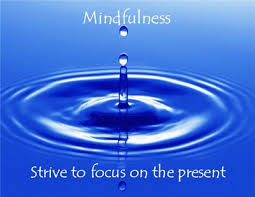A mindfulness revolution
Mindfulness is paying attention on purpose, in the present moment, with qualities of compassion, curiosity and acceptance. It can be defined as leadership done with awareness of, and attention to, self and others. The term is on most of the recent global trend lists, often cited as a way of being and thinking that will change your life. Very soon, practising mindfulness will be as natural for most of us as brushing our teeth. So why is mindfulness becoming so popular? The evidence is strong, but basically it improves our lives, our well being and helps us discover and live our life to a fuller potential.
 When is the last time you fully experienced something and were not distracted by something else that pulled urgently on your attention? When have you devoted your full attention to what was happening that very moment and experienced it with all of your senses? It doesn’t have to be a major event – it can be as simple as being in the moment while eating an apple. With the enormous rise in multitasking and constantly being connected with others across the globe through technology, we often mindfulness
When is the last time you fully experienced something and were not distracted by something else that pulled urgently on your attention? When have you devoted your full attention to what was happening that very moment and experienced it with all of your senses? It doesn’t have to be a major event – it can be as simple as being in the moment while eating an apple. With the enormous rise in multitasking and constantly being connected with others across the globe through technology, we often mindfulness
Are you experiencing life in the moment?
forget that being in the moment is what makes our life and work meaningful. And it is in those moments that we can often find our greatest innovation, creativity and harmony.
Many of us are constantly asked to work harder, faster and achieve better results without additional support. It leads to an enormous amount of pressure, and that’s when we often see a breakdown of communication, conflict, frustration and anger. Productivity and efficiency take a nosedive and it often leads to people giving up or, hopefully, looking for a way to improve the situation.
Surprisingly to some, often the best way to combat a very hectic environment is to take a step back mentally and focus on being mindful. Mindfulness is moment-by-moment awareness in the present. By actively focusing on your mindfulness, your mind learns how to focus on what is important and cuts out the noise while you order your thoughts. It can also simply open your mind to what is really happening so that you can then act or not with more skill and consideration for yourself and others.
Paying attention is something we do so selectively and haphazardly that we often don’t see what is right in front of our eyes. The same can be said for our other senses as well.
Living life on auto-pilot
Perhaps you’ve noticed that aeroplanes have a button called automatic pilot. When pilots push that button, they don’t have to consciously control the aircraft – the plane flies by itself. People can also run on auto-pilot when they’re in doing mode.
 Auto-pilot has some advantages which is why it has evolved in humans. Once something has become automatic, you don’t need to consciously think about it again and can give your attention to something else. Auto-pilot also saves some energy. Imagine if you had to think about every movement of your body when you were driving or walking – activities that involve hundreds of muscles – thinking in this way would be very tiring. In fact, you say someone has learnt something properly if he can do it automatically without thinking about it.
Auto-pilot has some advantages which is why it has evolved in humans. Once something has become automatic, you don’t need to consciously think about it again and can give your attention to something else. Auto-pilot also saves some energy. Imagine if you had to think about every movement of your body when you were driving or walking – activities that involve hundreds of muscles – thinking in this way would be very tiring. In fact, you say someone has learnt something properly if he can do it automatically without thinking about it.
Operating on auto-pilot may be ok for a little while, but if your whole life is run automatically, you miss what’s going on around you. Your mind thinks the same old thoughts, you may react unnecessarily when things don’t go your way, and your stress is compounded without you being fully aware of this process.
Mindful awareness, as opposed to automatic pilot, allows for the possibility of responding to situations by offering you a choice: a freedom from the mechanical, reactive, habitual patterns of your mind.
This trend too shall pass
If you’ve already heard of mindfulness, you may know that it is rooted in one of the oldest traditions of practice – Buddhism. The Buddha taught that mindfulness should be a part of one’s everyday life and that it is a key to wisdom. This idea of being aware of the reality of things in the present moment has had peaks of interest in mass Western culture since the 1970s, especially in the areas of yoga and meditation. The Huffington Post even declared 2014 ‘The Year of Mindfulness’.
But mindfulness is not a trend. It’s not a bit of jargon that will fade away or be proven a hoax. It has been around for thousands of years and will likely be around for thousands to come. While it may peak in popularity and public understanding, dismissing it as a fad or trend is unfair. In fact, mindfulness has been scientifically proven to have real physical and mental health benefits. Recent studies have linked it with reduced levels of stress, increased memory and focus, improved sleep and emotional stability and enhanced creativity. And that’s exactly why mindfulness deserves your attention and why you should consider mindful coaching.
Mindfulness is about taking time out, being nonjudgemental and having clear thinking in the moment. It can awaken you to possibilities and solutions that you don’t see when your mind is racing or is focused in the wrong area. Mindfulness trains your body to be more effective, and with the speed of modern working, it can turn you into a finely tuned machine. But being mindful takes work and practice, and often coaching is the best way to ensure it adds value to your life.
How do I become mindful?
 There is no checklist of mindfulness where you tick all the boxes and are suddenly a mindful person. It takes time, effort and continuous mindfulness on being mindful. That’s why mindful coaching, where another person can help you train your body and mind to work in a mindful way, is so effective.
There is no checklist of mindfulness where you tick all the boxes and are suddenly a mindful person. It takes time, effort and continuous mindfulness on being mindful. That’s why mindful coaching, where another person can help you train your body and mind to work in a mindful way, is so effective.
But the question ultimately comes back to, “How do I become mindful?” The answer boils down to these key areas:
The seven attitudes of mindfulness:
- Non-judging – Whether judging something positively or negatively, mindfulness requires true non-judging and non-categorising. Try not to ‘label’ anything as good or bad, right or wrong – rather just experience sensations, thoughts and feelings in every moment.
- Patience – The expectation of a particular outcome, or anxiety/impatience to get a desired result, can dominate the mind and hinder mindfulness. Remember that things will happen on their own, in their own time.
- Non-striving – Most of our lives are focused on making progress and doing things. Non-striving means being where you are and not trying to do anything else.
- Trust – Trust in yourself. You have a wealth of experience, knowledge, intuition and wisdom, so have belief in your own being. Just keep in mind, no matter what there will be mistakes along the way!
- Beginner’s mind – Balance trust with a beginner’s mind. We often overlook new possibilities because we believe we already ‘know’ the answer. A beginner’s mind gives you the curiosity and openness to new ways of thinking, feeling and being.
- Acceptance – Embrace things as they truly are. This should be an active acceptance, not simply a tolerance or detachment from what’s going on around you. Take a moment to pause, fully understand how things really are, and embrace it.
- Letting go – Whether it’s a pleasant or unpleasant idea, experience, desire, feeling or anything else – just let things be. Focus on what is happening at this very moment.
How does mindful coaching help?
Mindful coaching is about helping us to become aware of how our thoughts and emotions impact how we behave in the world and the impact that has on those around us – our family and friends and our working colleagues in particular. It’s also about recognising that we have built up habits that we no longer notice – whether they are beneficial to us is now hard to tell as they go unnoticed; we have become so practiced that it is like being on auto-pilot.
 There are many aspects of mindfulness in a coaching relationship. The coach needs to operate from a mindful perspective and help the coachee to build up mindfulness skills to allow both parties to reap the benefits.
There are many aspects of mindfulness in a coaching relationship. The coach needs to operate from a mindful perspective and help the coachee to build up mindfulness skills to allow both parties to reap the benefits.
Ten benefits of mindfulness:
- Improved wellbeing
- Rational decision making
- Focus and concentration
- Working memory improvement
- Creativity and innovation
- Increased emotional intelligence
- Improved cognitive flexibility
- Improved empathy and relationships
- Resilience
- Increased positivity and engagement
mindfulness - Coaches should ‘walk the talk’
Being a mindful coach
For the mindful coach, it is essential to walk your talk. The best way to help your coachee practice mindfulness and adopt new habits is to model that behaviour yourself. Regular practice is essential to be true to what you are ‘teaching’ as an authentic practitioner.
Being aware of outer and inner behaviours is also key – outer being listening, speaking and our actions. Inner being noticing and learning to recognise our filters, thoughts and judgements and bringing them under control so that we can operate from a position of openness and non-judging, then moving to skilful action when needed.
The coach needs to be open and fully aware, and not tied to a route that goes from A to B, but allow for possibilities, not mindless adherence to expectations. Perhaps most importantly, the coach needs to focus on building empathy with the coachee.
Active listening is really important of mindful coaching. Due to our habits and repeated behaviours we tend to filter out what we don’t value or sometimes things we don’t recognise. It’s like having a have a flip top head, we filter and kick out what is not interesting to us or what doesn’t fit to our picture or agenda. Mindfulness gives us the space to pause and listen.
A happier life from mindfulness
 Mindfulness is a filter and lens that we can apply to help us. It helps us to become friends with our habits and learn how to skilfully break those that are not helpful to us or others so that we can proactively respond to situations and people.
Mindfulness is a filter and lens that we can apply to help us. It helps us to become friends with our habits and learn how to skilfully break those that are not helpful to us or others so that we can proactively respond to situations and people.
There is an intense joy of really being in the moment with whatever we are doing, and it leads to more enhanced and enriched experiences and lives.
Article from Insights Newsletter, written by Ros Boughflower, Director, Social Innovation: www.socialinnovation.co.uk